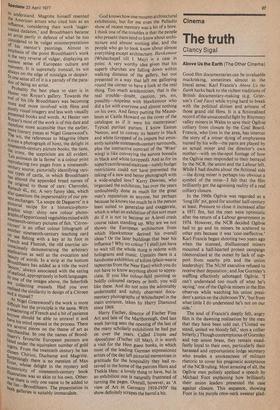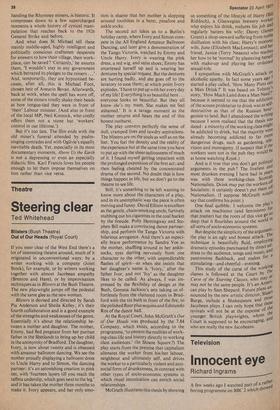Cinema
The truth
Clancy Sigal
Above Us the Earth (The Other Cinema) Good film documentaries can be invaluable muckraking, sometimes almost in the literal sense. Karl Francis's Above Us the Earth harks back to the richest traditions of British documentary-making (e.g. Grierson's Coal Face) while trying hard to break with the political elitism and artiness of those grand old films. It is a fictionalised record of the unsuccessful fight by Rhymney valley miners in Wales to save their Ogilvie colliery from closure by the Coal Board. Francis, who lives in the area, has intercut the story of a miner dying of emphysema nursed by his wife—the parts are played by an actual miner and the director's own mother—with on-the-spot footage of how the Ogilvie men responded to their betrayal
by the NCB, the union and the Labour left.
While I had doubts about the fictional side —the dying miner is perhaps too obvious a symbol of the mine—I felt that the film brilliantly got the agonising reality of a real colliery closure.
In the 1960s Ogilvie was regarded as a 'long life' pit, good for another half-century
at least. Pressure to close it increased after a 1971 fire, but the men were optimistic after the return of a Labour government in 1974. However, the NCB decided Ogilvie
had to go and its miners be scattered to other pits because it was 'cost-ineffective
Karl Francis began shooting two years ago
when the stunned, disillusioned miners mounted a half-hearted protest campaign (demoralised at the outset by lack of sup
port from nearby pits and the union leadership). The NUM executive refused to
receive their deputation; and Joe Gormley's waffling effectively sabotaged Ogilvie. 'I can't understand too much of what he's saying,' one of the Ogilvie miners in the film observes while watching his union president's antics on the clubroom TV, 'but from what little I do understand he's not on our side.'
The soul of Francis's deeply felt, angry film is the dawning realisation by the men that they have been sold out. ('United we stand, united we bloody fall,' says a collier bitterly.) Though contemptuous of Gormley and top union brass, they remain steadfastly loyal to their own, particularly their harassed and opportunistic lodge secretary
who exudes a smokescreen of militant rhetoric to cover his pragmatic acceptance of the NCB ruling. Most amazing of all, the
Ogilvie men politely applaud a speech by , Michael Foot explaining how brilliantly their union leaders presented the case against closure. This sequence, showing Foot in his purple crew-neck sweater glad
handing the Rhymney miners, is historic. It compresses down to a few supercharged moments a whole history of cynical manipulation that reaches back to the 1926 General Strike and before.
And what does St Michael tell these mainly middle-aged, highly intelligent and politically conscious craftsmen desperate for answers to how their village, their workplace, can be saved? 'Certainly,' he assures them, 'I wouldn't stay in any government which betrayed its pledges to the miners ...' And, temporarily, they are hypnotised because, after all, this is Michael Foot, chosen heir of Aneurin Bevan. Afterwards, back at work, when the spell has worn off, some of the miners tiredly shake their heads at how tongue-tied they were in front of 'their' Labour minister. (And also in front of the local MP, Neil Kinnock, who coolly offers them not a stone but 'workers' control in our lifetime.')
Bat it's too late. The film ends with the old miner's funeral attended by psalmsinging comrades and with Ogilvie's equally inevitable death. Yet, especially in its most documentary moments, Above Us the Earth is not a depressing or even an especially didactic film. Karl Francis loves his people enough to let them impose themselves on him rather than vice versa.



































 Previous page
Previous page